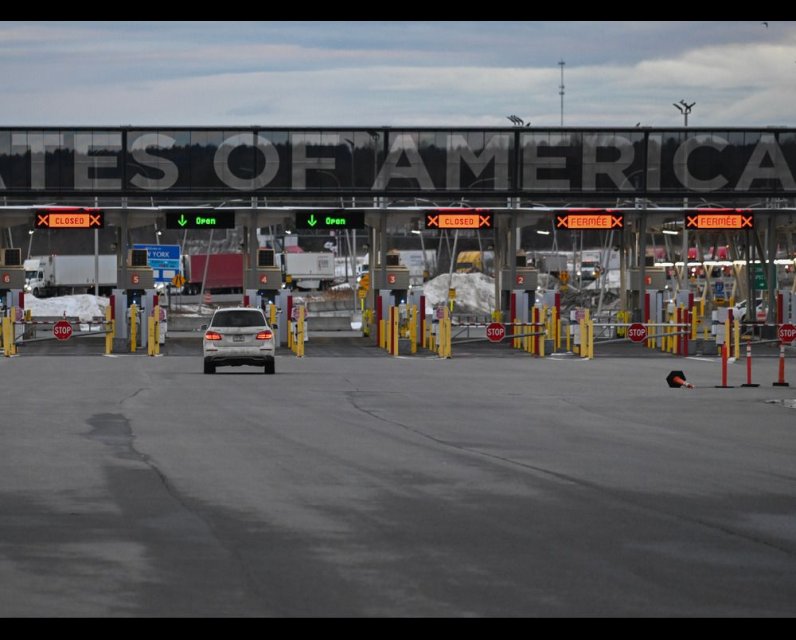What we know about unusual spike in asylum claims at this Quebec border crossing

In less than two weeks this month, a Quebec border crossing saw more than 1,500 asylum applicants coming from the United States, an unusual surge considering overall asylum claims are down by 50 per cent across Canada.
St-Bernard-de-Lacolle, a crossing located on Quebec’s Highway 15, south of Montreal, saw 1,505 asylum applicants between Canada Day and July 13. In June, 1,593 applied for asylum in Canada over the course of the whole month.
It represents a significant increase over 2024, when in the first two weeks of July, just 322 people tried to claim asylum in Canada. Many of the claimants are Haitians, fleeing insecurity at home and precarious legality in the United States, and seeking asylum in a French-speaking territory.
It’s not the first time that the Quebec border crossing has seen a major spike in claimants.
In April, 2,733 people applied for asylum in Canada at that border crossing. It’s an official border crossing that is near the infamous Roxham Road border crossing that is an irregular point of entry to Canada.
Here’s what to know about the border crossing and why there has been a surge in asylum seekers.
How many people have applied for asylum in Canada overall?
Between January and July 2025, there have been 19,730 asylum applications processed in Canada from people arriving at all ports of entry. This is a significant drop since 2024. By this time last year, the Canada Border Services Agency had processed 39,085 asylum applications.
How many have been sent back to the United States?
Of that total, 2,169 have been returned to the United States for being ineligible to enter Canada; 1,531 of those were people who made their asylum claims at official ports of entry, while the other 638 were irregular border crossers.
Both Canada and the United States are signatories to the Safe Third Country Agreement. It means, basically, that a refugee claimant must make a refugee claim in the first country they arrive in, and if they show up at the Canadian border after entering the U.S., unless they meet an exception to the rules, they can be sent back to America.
What are the exceptions?
There are four exceptions, said Pia Zambelli, chairperson of the refugee committee at the Canadian Immigration Lawyers Association. The first is family ties to Canada .
“This is the main exception,” said Zambelli.
The second is an exception for unaccompanied minors. The other two are exceptions for those with certain documentation, such as a valid study permit in Canada. The last one is a public interest exception, for those who may, for example, face the death penalty if returned to the United States.
What nationalities are arriving?
Haitians are the nationality making the most asylum claims in Canada at land border crossings. Many of them are crossing at the St-Bernard-de-Lacolle crossing, Zambelli said, because of its proximity to Montreal, a French-speaking city.
“There’s a huge Haitian community in Montreal,” Zambelli said.
Venezuelans make up the second-largest proportion of those seeking asylum in Canada at land border crossings.
Americans made up the third-largest proportion of those seeking asylum at land-border crossings.
Why are Haitians coming to Canada?
The government has more or less collapsed in Haiti and there is rampant gang violence in the failed state. This means that thousands of people are fleeing, if they can. Many ended up in the United States but have faced persecution under U.S. President Donald Trump’s administration.
Under former president Joe Biden, the U.S. government granted temporary legal status in the country to some 500,000 Haitians, the Montreal Gazette reported. Many of those people had been in the country since 2010, when Haiti was devastated by an earthquake.
However, in June the Trump administration moved to revoke that protection, meaning that hundreds of thousands of people could be at risk of being sent back to a failed state. T he Department of Homeland Security announced it was terminating the t emporary protected status for Haitians as of Sept. 2. However, a federal judge ruled this month that the Trump administration could not move up the expiration of their status, which was extended to Feb. 3, 2026 under former president Joe Biden.
Our website is the place for the latest breaking news, exclusive scoops, longreads and provocative commentary. Please bookmark nationalpost.com and sign up for our daily newsletter, Posted, here.

Comments
Be the first to comment